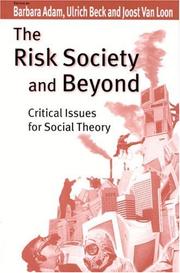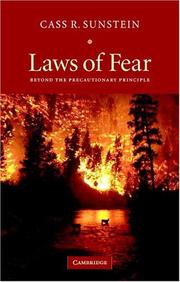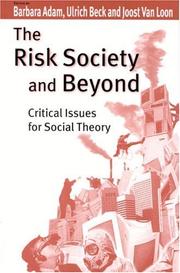| Listing 1 - 10 of 39 | << page >> |
Sort by
|
Multi
ISSN: 16514289 ISBN: 9185169188 9789185169184 Year: 2006 Publisher: Göteborg Göteborg University
Abstract | Keywords | Export | Availability | Bookmark
 Loading...
Loading...Choose an application
- Reference Manager
- EndNote
- RefWorks (Direct export to RefWorks)
Risk perception. --- Risk. --- Risk --- Risk perception --- Awareness, Risk --- Risk awareness --- Perception --- Economics --- Uncertainty --- Probabilities --- Profit --- Risk-return relationships

ISBN: 1446219534 1446222675 1282020536 9786612020537 1849202060 9781849202060 9780761964698 076196469X 9781446219539 9781282020535 6612020539 0761964681 076196469X 9780761964681 9781446222676 Year: 2000 Publisher: London : SAGE,
Abstract | Keywords | Export | Availability | Bookmark
 Loading...
Loading...Choose an application
- Reference Manager
- EndNote
- RefWorks (Direct export to RefWorks)
'The risk society and beyond' traces the evolution of Ulrich Beck's ideas as expressed in 'Risk Society' (1992) and expands into previously unforeseen risk areas, such as genetics and cyberspace.
Risk perception. --- Risk-taking (Psychology) --- Social sciences --- Social philosophy --- Social theory --- Risk behavior --- Risky behavior --- Taking risks --- Human behavior --- Awareness, Risk --- Risk awareness --- Perception --- Philosophy.
Book
ISBN: 047193464X 9780471934646 Year: 1992 Publisher: Chichester: Wiley,
Abstract | Keywords | Export | Availability | Bookmark
 Loading...
Loading...Choose an application
- Reference Manager
- EndNote
- RefWorks (Direct export to RefWorks)
Risk management --- Risk perception --- Risk --- Perception du risque --- Awareness, Risk --- Risk awareness --- 614.8 --- Perception --- Insurance --- Management --- Economics --- Uncertainty --- Probabilities --- Profit --- Risk-return relationships --- Risico. Ongevallen--(voor meer gedetailleerde uitwerking zie e-{614.8}) --- Gestion du risque
Book
ISBN: 3030286509 3030286495 Year: 2020 Publisher: Cham : Springer International Publishing : Imprint: Palgrave Macmillan,
Abstract | Keywords | Export | Availability | Bookmark
 Loading...
Loading...Choose an application
- Reference Manager
- EndNote
- RefWorks (Direct export to RefWorks)
This book outlines and systematises findings from a growing body of research that examines the different rationales, dimensions and dynamics of risk-taking in current societies; providing insight into the different motivations and social roots of risk-taking to advance scholarly debates and improve social regulation. Conceptually, the book goes beyond common approaches which problematise socially undesirable risk-taking, or highlight the alluring character of risk-taking. Instead, it follows a broadly interpretivist approach and engages in examining motives, control, routinisation, reflexivity, skills, resources, the role of identity in risk-taking and how these are rooted in and framed by different social forces. Zinn draws on qualitative studies from different theoretical and conceptual backgrounds such as phenomenology, hermeneutics, pragmatism, feminism, class analysis, theory of practice and discourse analysis among others, to outline key distinctions and concepts central to the understanding of risk-taking. It will be a key resource for everyone who is concerned with the understanding and management of risk-taking in all kinds of social domains, such as immigration, youth, leisure sports, crime, health, finance, and social policy.
Social sciences-Philosophy. --- Sociological Theory. --- Social Theory. --- Sociology of Culture. --- Risk perception. --- Awareness, Risk --- Risk awareness --- Perception --- Sociology. --- Social sciences—Philosophy. --- Culture. --- Cultural sociology --- Culture --- Sociology of culture --- Civilization --- Popular culture --- Social theory --- Social sciences --- Social aspects --- Social philosophy --- Philosophy.

ISBN: 0761947396 9786611361938 1281361933 1848600585 9781848600584 9781446216323 1446216322 6611361936 9781281361936 9780761947394 076194740X 9780761947400 9780761947396 Year: 2005 Publisher: London : SAGE,
Abstract | Keywords | Export | Availability | Bookmark
 Loading...
Loading...Choose an application
- Reference Manager
- EndNote
- RefWorks (Direct export to RefWorks)
Risk has come to dominate individual and collective consciousness in the 21st century. Although global insecurity is related to terrorism, pollution, global epidemics and famine risks involved in ordinary life such as food, tobacco smoking sunlight and travel have also become major preoccupations.
Risk --- Risk assessment. --- Risk perception. --- Awareness, Risk --- Risk awareness --- Perception --- Analysis, Risk --- Assessment, Risk --- Risk analysis --- Risk evaluation --- Evaluation --- Sociology of risk --- Sociology of uncertainty --- Uncertainty --- Sociology --- Sociological aspects. --- Sociological aspects --- Risk assessment --- Risk perception
Book
ISBN: 9780511735950 9780521171977 9781139128063 113912806X 1139115235 9781139115230 0511735952 9781139117401 1139117408 0521171970 1139113046 9781139113045 1107213495 1139124692 1283298538 1139123157 9786613298539 Year: 2011 Publisher: Cambridge ; New York : Cambridge University Press,
Abstract | Keywords | Export | Availability | Bookmark
 Loading...
Loading...Choose an application
- Reference Manager
- EndNote
- RefWorks (Direct export to RefWorks)
"Recent events from the economic downturn to climate change mean that there has never been a better time to be thinking about and trying to better understand the concept of risk. In this book, prominent and eminent speakers from fields as diverse as statistics to classics, neuroscience to criminology, politics to astronomy, as well as speakers embedded in the media and in government have put their ideas down on paper in a series of essays that broaden our understanding of the meaning of risk. After twenty-five years, the prestigious Darwin College Lectures are one of the most popular public lecture series at the University of Cambridge. The risk lectures in 2010 were amongst the most popular yet and, in essay form, they make for a lively and engaging read for specialists and non-specialists alike"--
Risk --- Risk perception. --- Risk assessment. --- Analysis, Risk --- Assessment, Risk --- Risk analysis --- Risk evaluation --- Evaluation --- Awareness, Risk --- Risk awareness --- Perception --- Sociology of risk --- Sociology of uncertainty --- Uncertainty --- Sociology --- Sociological aspects. --- Sociological aspects
Periodical
ISSN: 19961421 2072845X Year: 2006 Publisher: [Potchefstroom, South Africa] : [African Centre for Disaster Studies],
Abstract | Keywords | Export | Availability | Bookmark
 Loading...
Loading...Choose an application
- Reference Manager
- EndNote
- RefWorks (Direct export to RefWorks)
Disasters --- Emergency management --- Disaster relief --- Risk assessment --- Periodicals. --- Social aspects --- Disasters. --- Africa. --- Natural Disaster --- Natural Disasters --- Disaster --- Disaster, Natural --- Disasters, Natural --- Disaster assistance --- Emergency assistance in disasters --- Emergency relief --- Calamities --- Catastrophes --- Consequence management (Emergency management) --- Disaster planning --- Disaster preparedness --- Disaster prevention --- Emergencies --- Emergency planning --- Emergency preparedness --- Management --- Planning --- Preparedness --- Prevention --- natural disasters --- Risk awareness and assessment --- societal resilience --- mitigation and preparedness --- Disaster relief. --- Emergency management. --- Social aspects. --- Public safety --- First responders --- Human services --- Chernobyl Nuclear Accident --- Curiosities and wonders --- Accidents --- Hazardous geographic environments --- Eastern Hemisphere --- risk awareness and assessment --- Business policy

ISBN: 0521660092 0521669693 051117232X 0511004710 051115044X 0511310188 0511489846 1280420758 0511048459 1107117739 9780511489846 9780511004711 9780511150449 9780511048456 9780511172328 9780521660099 9780521669696 9781107117730 9781280420757 9780511310188 Year: 1999 Publisher: Cambridge, UK ; New York, NY, USA : Cambridge University Press,
Abstract | Keywords | Export | Availability | Bookmark
 Loading...
Loading...Choose an application
- Reference Manager
- EndNote
- RefWorks (Direct export to RefWorks)
From earthquakes to epidemics, AIDS to industrial accidents, the mass media continually bring into our daily lives the awareness of risk. But how do people respond to this increased awareness? How do people cope with living in what has been termed 'the risk society'? This book attempts to explain how, within a given social and cultural context, individuals make sense of impending crisis. In particular it tries to explain the phenomenon of a widespread sense of personal invulnerability when faced with risk: the 'not me' factor. Using a social psychological framework it highlights emotional factors which are a key component of responses to risk but have hitherto been neglected due to the tendency of much work on risk to concentrate almost exclusively on cognitive processing. This book will appeal to an international audience of post-graduates, academics and researchers in the areas of risk, psychology, sociology, medical anthropology and psychoanalytic studies.
Risk perception. --- Social psychology. --- Other minds (Theory of knowledge) --- Perception du risque --- Psychologie sociale --- Altérité --- Risk perception --- Social psychology --- Other minds (Theory of knowledge). --- Social Change --- Sociology & Social History --- Social Sciences --- Health Sciences --- Psychiatry & Psychology --- Altérité --- Minds of others (Theory of knowledge) --- Mass psychology --- Psychology, Social --- Awareness, Risk --- Risk awareness --- Knowledge, Theory of --- Mind and body --- Human ecology --- Psychology --- Social groups --- Sociology --- Perception

ISBN: 0521615127 0521848237 9780521615129 9780521848237 9780511790850 110714115X 0511181167 0511790856 0511111568 0511326726 1280416165 0511197705 0511111231 9780511111563 0511110243 9780511110245 9780511111235 9781280416163 9780511181160 9780511197703 9780511326721 Year: 2005 Publisher: Cambridge, UK ; New York : Cambridge University Press,
Abstract | Keywords | Export | Availability | Bookmark
 Loading...
Loading...Choose an application
- Reference Manager
- EndNote
- RefWorks (Direct export to RefWorks)
What is the relationship between fear, danger, and the law? Cass Sunstein attacks the increasingly influential Precautionary Principle - the idea that regulators should take steps to protect against potential harms, even if causal chains are uncertain and even if we do not know that harms are likely to come to fruition. Focusing on such problems as global warming, terrorism, DDT, and genetic engineering, Professor Sunstein argues that the Precautionary Principle is incoherent. Risks exist on all sides of social situations, and precautionary steps create dangers of their own. Diverse cultures focus on very different risks, often because social influences and peer pressures accentuate some fears and reduce others. Instead of adopting the Precautionary Principle, Professor Sunstein argues for three steps: a narrow Anti-Catastrophe Principle, designed for the most serious risks; close attention to costs and benefits; and an approach called 'libertarian paternalism', designed to respect freedom of choice while also moving people in directions that will make their lives go better. He also shows how free societies can protect liberty amidst fears about terrorism and national security. Laws of Fear represents a major statement from one of the most influential political and legal theorists writing today.
Risk perception. --- Fear --- Precautionary principle. --- Civil rights. --- Social aspects. --- Social Sciences --- Political Science --- Fear - Social aspects. --- Awareness, Risk --- Risk awareness --- Perception --- Basic rights --- Civil liberties --- Civil rights --- Constitutional rights --- Fundamental rights --- Rights, Civil --- Constitutional law --- Human rights --- Political persecution --- Precautionary approach --- Environmental law --- Environmental risk assessment --- Law and legislation --- Principe de précaution --- Perception du risque --- Peur --- DROITS CIVILS --- aspects sociaux

ISBN: 076196469X 0761964681 9780761964698 9780761964681 Year: 2002 Publisher: London: Sage,
Abstract | Keywords | Export | Availability | Bookmark
 Loading...
Loading...Choose an application
- Reference Manager
- EndNote
- RefWorks (Direct export to RefWorks)
316.32 --- #SBIB:321H30 --- 316.32 Globale samenlevingsvormen --- Globale samenlevingsvormen --- Hedendaagse politieke en sociale theorieën (vanaf de 19de eeuw): algemeen (incl. utilitarisme, burgerschap) --- Risk perception --- Risk-taking (Psychology) --- Social sciences --- Social philosophy --- Social theory --- Risk behavior --- Risky behavior --- Taking risks --- Human behavior --- Awareness, Risk --- Risk awareness --- Perception --- Philosophy --- Sociological theories --- Risk perception. --- Risk-taking (Psychology). --- Philosophy. --- Risk management --- Gestion du risque --- Social sciences - Philosophy
| Listing 1 - 10 of 39 | << page >> |
Sort by
|

 Search
Search Feedback
Feedback About UniCat
About UniCat  Help
Help News
News